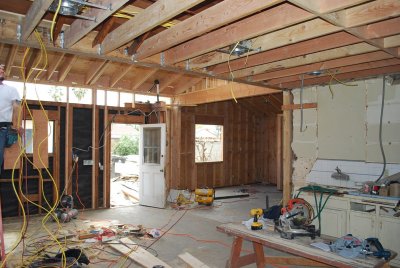It’s not uncommon for homeowners to find unpermitted work when it comes time to sell.
There can be a few reasons construction doesn’t end up permitted . . .
Home construction laws change from neighborhood to neighborhood, and the rules can be complicated for those who don’t have the time to dissect many subsections of legal jargon. Some owners begin construction work without obtaining a building permit because they don’t want to deal with the hassle even if they know they’re supposed to check with the local municipality first.
If you discover unpermitted work when you begin to enter the sale process, make sure to find out more about the nature of permits, what can be done about unlawful work, and who should pay for it all.
We Buy Houses in Any Condition – Even With Unpermitted Work!
Just Fill Out This Form For Your FAIR Cash Offer.
Understanding Unpermitted Work
Unpermitted work refers to any construction or renovation done without the necessary legal building permits. This can include projects such as adding a new deck, installing a new electrical system, or making structural changes to a property. Unpermitted work can be a costly and time-consuming issue, especially when it comes to selling a house. It’s essential to understand the risks and consequences associated with unpermitted work to make informed decisions when buying or selling a property.
How Permits Work
New home buyers are supposed to receive the information they need to decide whether or not a home is right for them. If the previous owner had worked on the property, they should ideally supply receipts, permits, and official documentation to assure the new buyer everything was legally completed.

But some sellers either neglect to tell a buyer or they simply never realized they were supposed to get notarized approval. Some neighborhoods allow homeowners to do practically every kind of DIY renovation or improvement to their house without a permit, some allow certain DIY repairs to be completed with a permit, and some neighborhoods require licensed contractors to complete home repair work.
Doing the Work
Sellers who want to have all the facts before putting their home on the market will usually have to do some research. Even though it wasn’t the seller’s fault, they may need to pay for additional work or spend time gathering historical documents to find out more about the nature of the work. In certain cases, the seller may find open permits that were never closed by the previous homeowners.
Understanding the permit process is crucial for sellers to ensure all work is properly documented and approved.
Public records for properties are typically housed at city/town hall, the county courthouse, or county recorder – going in person can be more effective than calling, but responses vary from place to place. Look for the Certificate of Occupancy inspector’s report, as they will have records of finished or outstanding permits. This inspection will typically question any improvements made that appear to require a permit but do not at the time of inspection. If the home seller is unaware of previous improvements all-together, they may need to enlist the help of a home inspector to identify anything that does not look up-to-code. While inspectors cannot necessarily tell a seller or buyer exactly what to do next, they are able to refer to the correct specialists.
Sellers may also want to check the original blueprints of the home to identify the changes that were made to the original structure. If there were major renovations completed on the property, they may need an architect to draw up new plans for the home. However, even with all this extra effort, sellers may not be able to get all the facts they need.
Knowing the Unknown
Not only can it be difficult to decipher the local regulations of each neighborhood, but the laws will fluctuate from year-to-year.
Sellers often can’t tell which rules were broken when it comes to the unpermitted work they find because there’s no documentation behind them. They may find specific hard-and-fast facts (e.g., the previous homeowner used the incorrect screws to secure a fixture), but they won’t be able to verify the safety of the worker or whether or not the work violated previous laws during the year of completion. Sellers may not be able to even understand the full extent of the job if they’re unwilling to dig deep into the walls or floors. They have two options to take if they know (or suspect) illegal work was completed.
Option 1: How Retroactive Permits Work
Sellers who want to assure their buyers that the home is up to code have the option to obtain a retroactive permit. Like traditional permits, the laws for retroactive permits vary depending on the location of the

home. To get a retroactive permit, a homeowner will have to invite city inspectors to come to the home and sign off on the work. Inspectors will either do so outright or suggest additional improvements to the work (with the required permits, of course.) Retroactive permits are usually recommended for sellers who find unpermitted work on their property because it allows them to sell the home in total confidence.
Option 2: Selling the Property As-Is
It’s possible for sellers who find unpermitted construction work to sell the house as-is. Sellers do not have to admit to a buyer or the city that there’s unpermitted work done on the home, but they are required to answer buyer’s questions honestly. In other words, a buyer would have to point blank ask if there’s unpermitted work on the home before the seller has to say anything.
Regardless of whether or not a buyer asks these questions though, a home labeled ‘as-is’ is a huge tip-off to potential buyers that they may be buying a substandard structure. This option is only recommended for sellers who need to sell their home as quickly as possible (and who don’t have time negotiate with city officials.)
Safety Hazards and Fines
Unpermitted work can create safety hazards, such as electrical or plumbing issues, that can put occupants at risk. Additionally, homeowners may face fines and penalties from local building authorities for non-compliance with building codes and regulations. These fines can be substantial, and in some cases, may even lead to immediate loan repayment or increased property taxes.
Preparing to Sell
When selling a house with unpermitted work, it’s essential to prepare for the potential consequences. Homeowners should disclose unpermitted work to potential buyers and consider obtaining retroactive permits to legalize the work.
Disclosing Unpermitted Work to Buyers
Disclosing unpermitted work to potential buyers is crucial to avoid potential lawsuits and ensure a smooth selling process. Homeowners should provide detailed information about the unpermitted work, including the type of work done, the date it was completed, and any relevant documentation. This transparency can help build trust with potential buyers and reduce the risk of costly disputes.
By understanding the risks and consequences associated with unpermitted work, homeowners can make informed decisions when buying or selling a property. It’s essential to work with a qualified real estate agent and consider obtaining retroactive permits to ensure a smooth and successful transaction
Risks and Consequences
Unpermitted work can pose significant risks to homeowners, including safety hazards, fines, and potential lawsuits. Without proper permits, there’s no assurance that the work was done correctly or in compliance with local building codes and regulations. This can lead to costly repairs, fines, and even lawsuits from potential buyers or neighbors.
How Local Officials React
For the most part, neighborhood authorities understand that homeowners aren’t always going to read every building code before they decide to renovate their kitchen. This means that owning up to unpermitted work may be easier than the seller thinks. As long as they have some information to present after doing their due diligence, authorities may be more than willing to cut a deal.
In some cases, homeowners may need to obtain a retroactive building permit to ensure the work complies with current codes.
However, it should be noted that if the authorities wanted to make it difficult on a seller, they may try and do so. Certain areas are known to hike up their prices for sellers if the city’s budget needs a boost, even if it’s not the norm. Most authorities will let the work stand as long as it’s not a danger to anyone either residents or neighbors.
Who Should Pay

Sellers are required to take financial responsibility for the home, but they’re understandably unhappy when they have to pay for someone else’s mistakes. Sellers are encouraged to carefully read through their original buyer disclosure statement. If the work was never disclosed, they can request funds from the previous owner. The real estate agent and home inspector may share legal responsibility as well if they failed to catch the unpermitted work.
Finally, if the seller purchased a premium title insurance policy that covered unpermitted construction, then they can go through their title insurance company. But as sellers might imagine, it may be more hassle than it’s worth to prove what people knew and what they should have known at the time.
The rules for permits can be frustrating, but they do serve a very valuable purpose. Homeowners may own their own property, but they don’t live on an island. They have to ensure their plumbing, tree roots, and gas lines don’t end up inadvertently harming their home or their neighbor’s homes. While sellers can choose to sell their property as-is, they’re taking a very big risk by doing so. Not only are they likely to attract bargain-hunters who will drive the price down, but they could also potentially endanger people’s safety if the work poses a threat to either the future homeowners or the neighbors.
We Buy Houses!
Just Fill Out This Form For Your FAIR Cash Offer.

